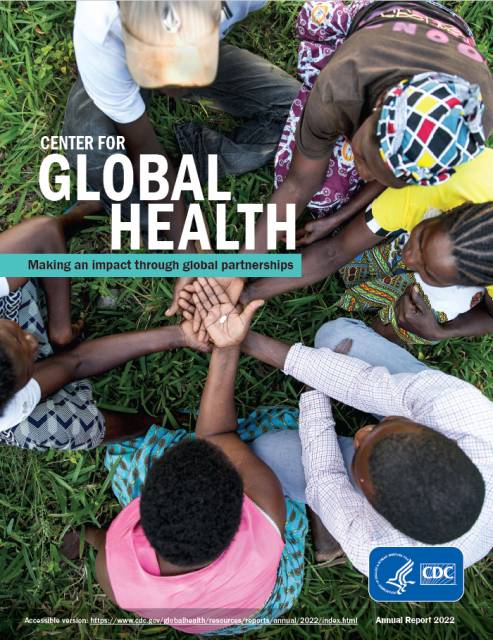You are here
New Report Highlights CDC’s Impact through Global Partnerships
In the newly released report, “Making an Impact Through Global Partnerships,” the Centers for Disease Control and Prevention (CDC) highlights longstanding partnerships and the agency’s unique scientific and technical capacities in global health security, epidemiology, surveillance, laboratory systems, emergency response and workforce development. CDC’s Center for Global Health (CGH) works with U.S. government agencies, multilateral partners, and ministries of health in Africa, Asia, Latin America, Europe and other regions to implement programs and tackle profound health threats, including COVID-19.
No community, district, province or nation will be truly safe and healthy until all are, and no country, including the United States, can be free from the risk until all nations have the core public health capabilities and health systems needed to protect the most marginalized. Today, CDC’s Center for Global Health works through CDC offices in more than 60 countries and has more than 1,700 in-country staff worldwide working directly with ministries of health, local partners, the World Health Organization (WHO) and others to maximize global health impact—saving lives, improving health and addressing disease outbreaks at their source. CGH uses data-driven, locally appropriate approaches that are constantly informed and adapted based on the latest innovations and the best available science.
For over 25 years, the CDC Foundation has worked with CDC as a cross-sector convener, building public-private partnerships to accomplish more together than any one stakeholder or sector can accomplish alone. With donor funding, the CDC Foundation has bolstered CDC’s partner response and outbreak detection capacity on diseases like malaria and COVID-19. The CDC Foundation partners with CDC’s Center for Global Health to manage global health security programs worldwide, as well as programs related to malaria surveillance, prevention and treatment. Our work on the RTS,S malaria vaccine in Kenya played a vital role in informing WHO’s recommendation of the vaccine for widespread use among children at risk of dying from malaria.
The CDC Foundation also works with CDC to control, eliminate and eradicate neglected tropical diseases such as lymphatic filariasis, the leading cause of permanent disability worldwide. In American Samoa, the last remaining known American territory with ongoing lymphatic filariasis transmission, CDC Foundation and the CDC have partnered with the Department of Public Health to carry out elimination strategies.
Vaccine distribution has been critical in the global response to COVID-19 pandemic. CDC collaborates with ministries of health, partner organizations and multinational entities, including WHO, on COVID-19 Vaccines Global Access (COVAX), the global collaboration to accelerate the development, production and equitable access to COVID-19 tests, treatments and vaccines. The CDC Foundation supports these partners in Haiti as they plan, implement and evaluate national COVID-19 vaccination programs to establish and strengthen sustainable immunization programs.
The CDC Foundation is proud to help extend CDC’s global health preparedness and response efforts by building and sustaining global partnerships. We look forward to continuing this work to make our world healthier, safer and more prepared for the next global health challenge.

